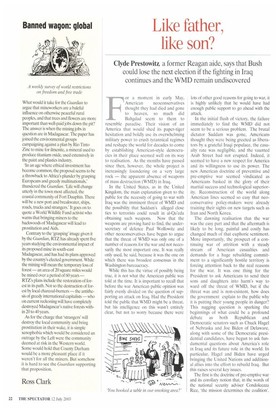Banned wagon: global
A weekly survey of world restrictions on freedom and free trade
What would it take for the Guardian to argue that mineworkers are a baleful influence on otherwise peaceful rural peoples, and that trees and flowers are more important than well-paid jobs down the pit? The answer is when the mining jobs in question are in Madagascar. The paper has joined the environmental groups campaigning against a plan by Rio Tinto Zinc to mine for ilmenite, a mineral used to produce titanium oxide, used extensively in the paint and plastics industry.
'In an age where ethical investment has become common, the proposal seems to be a throwback to Africa's plunder by grasping Europeans and greedy multinationals,' thundered the Guardian. 'Life will change utterly in the town most affected, the coastal community of Fort Dauphin. There will be a new port and breakwater, ships, roads, trucks and strangers.' It goes on to quote a World Wildlife Fund activist who warns that bringing miners to the backwoods of Madagascar will lead to prostitution and Aids.
Contrary to the 'grasping' image given it by the Guardian, RTZ has already spent five years studying the environmental impact of its proposed mine in south-east
Madagascar, and has had its plans approved by the country's elected government. While the mining will mean the temporary loss of forest — an area of 20 square miles would be mined over a period of 60 years — RTZ's plans include the restoration of forest in its path. Not so the destruction of forest by local charcoal-burners — the antithesis of greedy international capitalists — who on current reckoning will have completely destroyed Madagascar's native forests within 20 to 40 years.
As for the charge that 'strangers' will destroy the local community and bring prostitution in their wake, it is simple xenophobia which would be considered an outrage by the Left were the community deemed at risk in the Western world. Some would hold that County Durham would be a more pleasant place if it weren't for all the miners. But somehow it is hard to see the Guardian supporting that proposition.
Ross Clark


































































 Previous page
Previous page